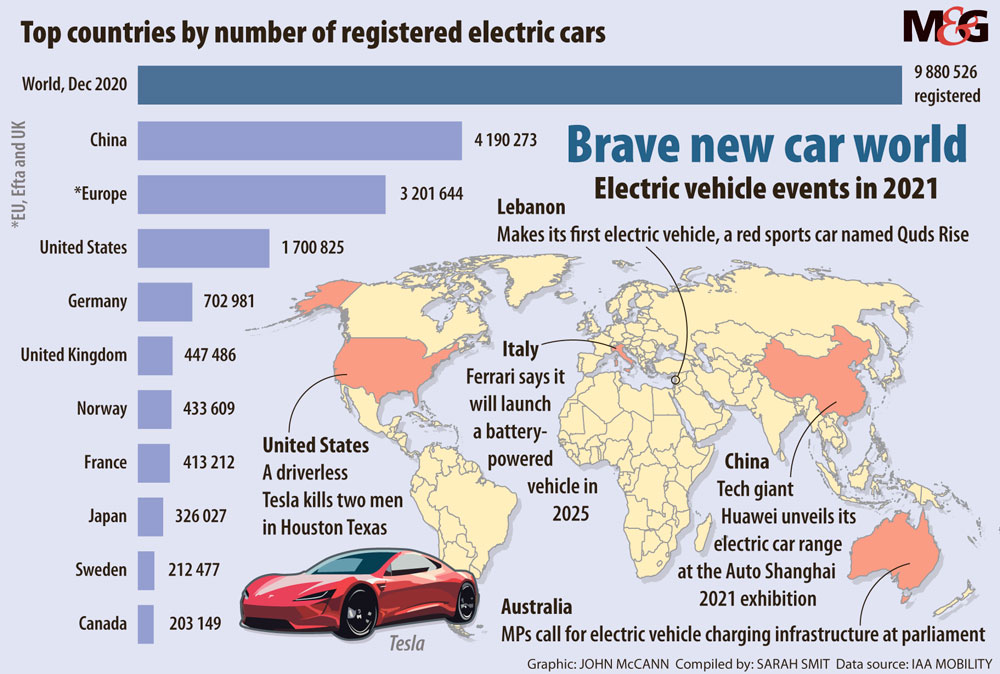Trend-setter: An e6 electric taxi (centre) made by BYD company waits at an intersection in Taiyuan, China. Taiyuan was the first city to replace its entire fleet of taxis with electric vehicles. (Qilai Shen/Bloomberg/Getty Images)
Globally, about 10-million electric cars on the roads — but only 1 509 of them are in South Africa. According to a recently released global ranking by the Munich Mobility Show, the world’s largest vehicle show, China tops the list of countries with the most registered vehicles, with more than four million of these cars on its road.
China is followed by the United States (1.7-million), Germany (702 981), the United Kingdom (447 486) and Norway (433 609).
Local industry experts said that South Africa needs to expedite its shift into the industry, which will benefit the economy, motorists and the environment.
Gaylor Montmasson-Clair, a senior economist at the nonprofit economic research organisation Trade & Industrial Policy Strategies (TIPS) said: “You are seeing all the signals from manufacturers globally. More and more of them are setting targets to transition to only electric vehicles. So it’s not like the world is going to carry on making internal combustion engines just for us.”
The department of trade, industry and competition did not respond to the Mail & Guardian’s queries about its plans to support electric vehicle adoption in South Africa. But Minister Ebrahim Patel is consulting the National Association of Automobile Manufacturers of South Africa (Naamsa) about the development of policy on electromobility and related matters.
The director of the uYilo e-mobility programme, Hiten Parmar, said the government and industry have been having discussions about electric vehicles for the past 18 months. They most recently met last Thursday.
uYilo was established in 2013 to facilitate electric vehicle development in South Africa.
Parmar said South Africa has a strong local vehicle manufacturing industry, which, before the Covid-19 pandemic, contributed about 7% of GDP.
“Because we have such a strong manufacturing industry, that has dictated the normal import-export regimes that are in place.”
He added: “And I think what’s happened is that international technology developments have moved quite quickly, while the incentives around local manufacturing [have] not specifically acknowledged electric vehicles.”
In June last year, the TIPS published a paper on how South Africa can use electric vehicles to galvanise industrial development.
The paper, compiled for the department of trade and industry and Naamsa, noted that the main factors hindering electric vehicle adoption were high costs — exacerbated by VAT, excise tax and import tariffs — as well as limited product availability.
The TIPS research recommended that the government review taxes on electric vehicle imports or facilitate a preferential interest rate for electric vehicle finance to address high costs.
Parmar said the government also needs to provide local manufacturing with incentives. “Government can change the incentive programme for multinational car companies, which already manufacture in South Africa, so they can get rebates on local electric vehicle manufacturing. I think this is the biggest carrot that government can put out there.”
 (John McCann/M&G)
(John McCann/M&G)
The continued focus on internal combustion engine vehicles could hurt the local industry, especially as industry in the rest of the world is turning to more environmentally sustainable alternatives, Parmar said.
About 60% of the vehicles manufactured in South Africa are exported to the European Union, he said. But the EU is considering emission rules that could ban internal combustion vehicles by 2025. “South Africa could lose its principal markets of export — of its crown jewel industry — if it does not change to EVs [electric vehicles]. This is where production incentive programmes are critical.”
Montmasson-Clair said the probable effect of electric cars on the local vehicle industry and the economy must become a factor when considering new policies.
“For me the primary reason for transitioning to electric vehicles is economics and the socioeconomic implications that are coming our way. With that comes some environmental benefits. But there are many other benefits,” he said.
More electric cars would mean that South Africa would not have to rely so heavily on fuel imports, which drive up the cost of petrol. And running an electric vehicle is much cheaper than a petrol car, Montmasson-Clair noted.
He said the government needs to send strong signals to develop the local electric vehicle market, which is already happening in the global market.
“We’re not the only country behind the curve, but the shift is evident. So we really need to get into gear about getting the market ready, consumers ready, the infrastructure and the policy framework and so on.”
Montmasson-Clair added: “Yes, we are behind the curve. But we are behind the curve with most of the world … So it’s not too late. It’s not too late at all.”